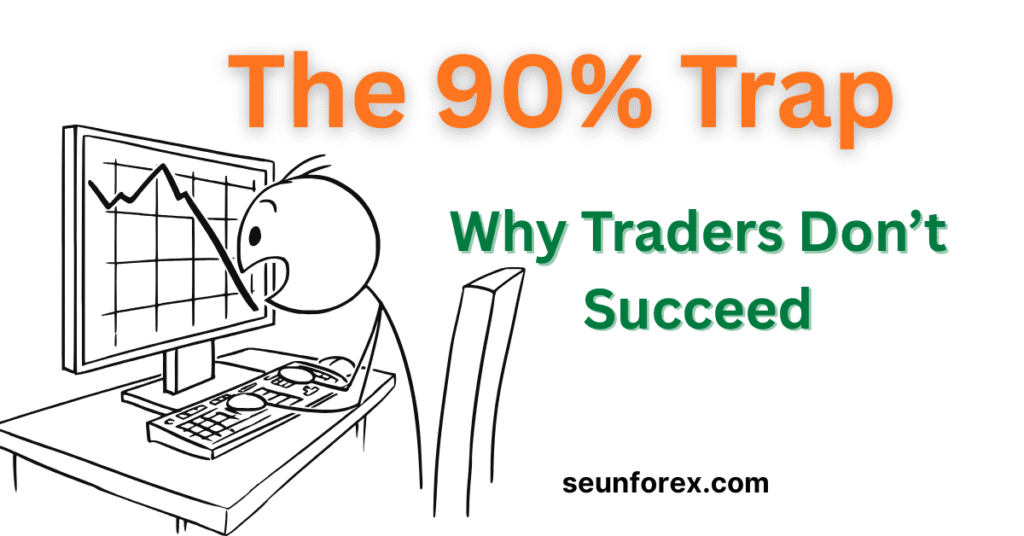
🔑 Introduction: The Harsh Reality of Day Trading
Why 90% of day traders lose money is not just a statistic—it’s the painful truth echoed across Wall Street trading floors in New York, the bustling streets of London, and even in cybercafés across Lagos. This harsh reality defines the difference between those who succeed and those who quit.
Many beginners step into forex with dreams of financial freedom, quick profits, or escaping the 9-to-5 grind. But without discipline, most fall into forex trading mistakes, neglect proper risk management in trading, and underestimate the power of trading psychology.
Here’s the good news: you don’t have to be part of the losing 90%. In this article, we’ll break down the eight major reasons traders fail—and show you how to become a profitable trader by learning from both Nigerian hustlers with $100 accounts and Wall Street rookies trying to prove themselves in prop firms.
💡 Lesson 1: The Psychology Trap – Greed, Fear, and Overconfidence
If there is one silent killer in trading, it is not the market—it is the mind of the trader.
Every beginner enters the market with the same mindset: “I’ll just double this account, cash out big, and then relax.” It sounds simple, but markets are designed to punish greed and overconfidence.
🌍 The Global Picture
On Wall Street, thousands of rookie traders blow accounts every year because they confuse luck for skill. They make one or two good trades, start believing they’re the next Warren Buffett, and then go all in on the next “perfect setup.” The result? A wiped-out account in one bad move.
🇳🇬 The Nigerian Reality
In Nigeria, the psychology trap is even sharper because of the hustle mentality. Many young traders fund accounts with ₦50,000 or ₦100,000, expecting to flip it into millions in weeks. The mindset is:
“If this guy on Instagram can buy Benz from trading, why not me?”
But markets don’t care about your hustle. One oversized trade, one bad emotional reaction, and the account is gone.
⚖️ The Three Emotions That Kill Traders
- Greed – wanting to turn every trade into a jackpot.
- Fear – cutting winners too early, letting losers run.
- Overconfidence – believing one good week means you’ve mastered the market.
As legendary trader Paul Tudor Jones once said:
“Don’t focus on making money; focus on protecting what you have.”
In other words, trading is survival first, profits second.
✅ How to Beat the Psychology Trap
- Enter every trade with humility: assume the market can prove you wrong.
- Use a fixed plan: don’t risk more just because the last trade was a win.
- Think long-term: the goal is not to get rich in one week, but to stay in the game long enough for skill and consistency to pay off.
📉 Lesson 2: Underestimating Risk Management
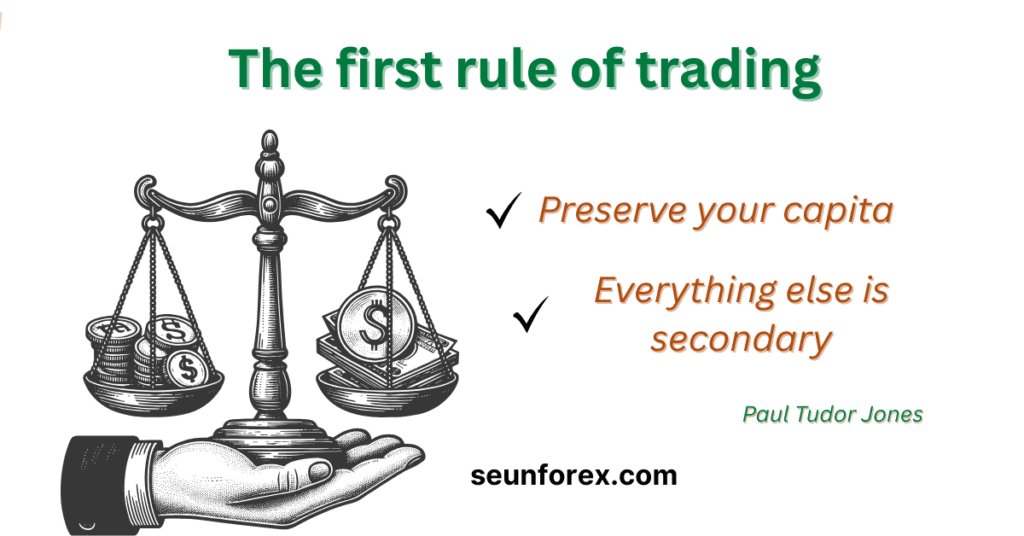
If trading were a football match, risk management would be the defense. Without it, no matter how many goals you score, one counterattack can wipe you out.
Unfortunately, 90% of day traders treat risk like an afterthought. They focus on entries, strategies, indicators—but forget that it only takes one bad trade to blow up an account.
🌍 The Global Picture
Even in developed markets like the U.S. or Europe, rookie traders often blow up because they risk too much per trade. For example, a trader with a $10,000 account may risk $2,000 on one position. If the trade goes wrong, they lose 20% instantly. Two or three bad trades—and the account is gone.
On Wall Street prop firms, risk managers constantly monitor traders. If you hit your daily loss limit, you’re cut off for the day. Why? Because they know the fastest way to bankruptcy is ignoring risk rules.
🇳🇬 The Nigerian Reality
In Nigeria, the situation is even more brutal. Why 90% of day traders lose money becomes painfully obvious here. Most retail traders are running small accounts—maybe $50, $100, or at most $500. Because the capital is small, they feel pressure to “flip it fast,” which is one of the most common forex trading mistakes.
This is where disaster starts. Imagine someone with $100 trading 0.5 lots on EURUSD. That’s like bringing a knife to a gunfight. One small market move against them, and the entire account is finished. Without proper risk management in trading and a clear understanding of trading psychology, even experienced traders can blow accounts quickly.
You’ll often hear traders say:
“Na small money I deposit, make I just try big lot size. If e work, I don hammer. If e no work, na small loss.”
But the truth is, this mindset ensures you’ll keep depositing again and again, with no progress.
⚖️ The Simple Math of Risk
Here’s a universal rule every successful trader knows:
- Risk 1–2% per trade.
If you have $100, don’t risk more than $1–$2 per trade.
If you have $1,000, don’t risk more than $10–$20 per trade.
This way, even if you lose 10 trades in a row, you still have capital left to recover.
Another key is risk-to-reward ratio. If you risk $10, you should aim to make at least $30 (1:3). That way, even if you only win 3 out of 10 trades, you’re still profitable.
✅ How to Beat the Risk Management Trap
- Use stop-loss every time. Never leave trades open “hoping” they will turn.
- “Choose brokers like Exness that offer reliable execution and negative balance protection, or IC Markets for tight spreads that help preserve your risk-reward ratios.”
- Calculate position size. Don’t pick lot size randomly—use a position size calculator.
- Think survival. Your job is not to double your money in one day. Your job is to last long enough to learn, grow, and compound.
As Bruce Kovner, a legendary trader, once said:
“If you personalize losses, you can’t trade.”
Risk management removes the emotions and allows you to trade like a professional, not like a gambler.
🧮 Lesson 3: The Math Doesn’t Lie – Transaction Costs and Slippage
Many new traders underestimate how small hidden costs can eat their accounts alive. You might think you’re breaking even or even slightly profitable, but in reality, your broker is making money off you while your account slowly drains.
🌍 The Global Picture
Every time you place a trade, you pay something:
- Spread (the difference between buy and sell price)
- Commission (fixed charge per lot/trade)
- Swap/Overnight fees (if you hold positions overnight)
This is one reason why 90% of day traders lose money—trading costs eat into profits before the trade even moves in your favor. For a professional trader with a large account, these costs are manageable because they plan trades carefully and follow strict risk management in trading rules.
But for day traders—especially scalpers—who enter and exit the market many times a day, these costs stack up quickly. Without proper forex trading mistakes awareness or understanding of trading psychology, small inefficiencies can snowball into a blown account.
For example, if you place 20 trades in one day with an average spread of 2 pips, that’s 40 pips gone to your broker—before you even start winning. Over a month, those “tiny” costs could equal hundreds of dollars, highlighting exactly why 90% of day traders lose money in practice.ual hundreds of dollars, highlighting exactly why 90% of day traders lose money in practice.
🇳🇬 The Nigerian Reality
In Nigeria, many retail traders are victims of brokers with wide spreads or hidden charges. Some brokers advertise “zero spread” but add hidden commissions. Others give attractive bonuses, only to trap traders with withdrawal restrictions.
A common story:
A trader deposits $50, scalps EURUSD 30 times in one day, and “should” be up $10. But after spreads, commissions, and slippage, the account is actually down. The trader blames the market—but in reality, the math never lied.
⚖️ The Silent Killer: Slippage
Slippage happens when you try to buy/sell at a price, but due to volatility, you get filled at a worse price. For example:
- You want to buy EURUSD at 1.1000.
- By the time your order executes, you enter at 1.1003.
Three pips lost instantly. Repeat this over dozens of trades, and your account bleeds quietly.
✅ How to Beat the Cost Trap
- Choose the right broker. Regulated, low-spread, transparent.
- Trade less, aim higher. Fewer trades with bigger risk-to-reward are better than 100 scalps.
- Check fees. Always calculate the “real” cost before entering a trade.
As trading legend Ed Seykota said:
“The elements of good trading are: (1) cutting losses, (2) cutting losses, and (3) cutting losses. If you can follow these three rules, you may have a chance.”
And part of cutting losses is cutting unnecessary costs.
🎢 Lesson 4: Emotional Rollercoaster and Revenge Trading
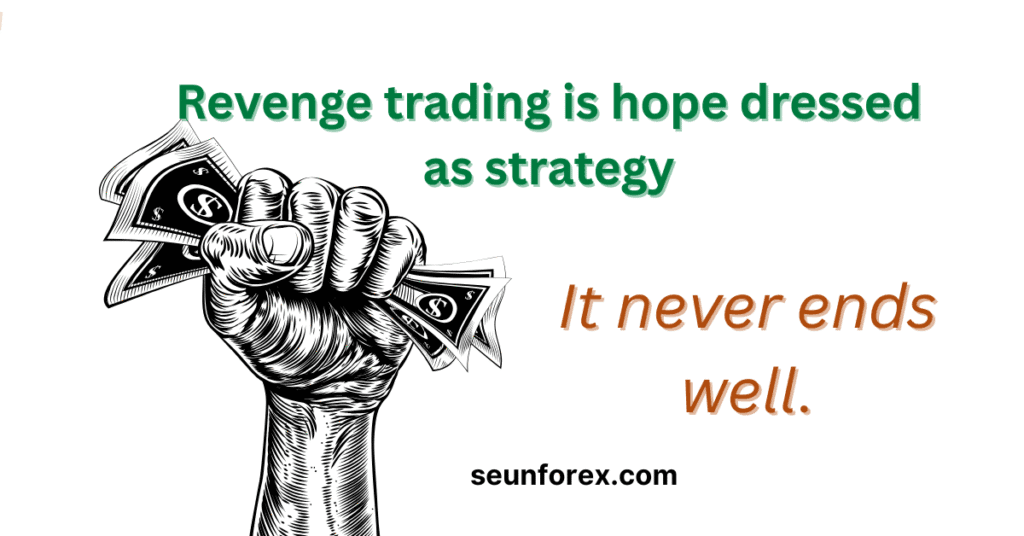
If costs slowly kill accounts, emotions destroy them instantly.
The market is a psychological battlefield. Every tick up or down can trigger fear, greed, or frustration. And when traders let emotions guide their decisions, disaster follows.
🌍 The Global Picture
On Wall Street, even professional traders struggle with revenge trading. After a losing trade, the urge to “get it back” is almost irresistible. A trader doubles position size, abandons the plan, and prays the market moves in their favor.
Most times, it doesn’t. And instead of recovering, they dig a deeper hole.
🇳🇬 The Nigerian Reality
In Nigeria, this plays out every day in WhatsApp groups and Telegram channels. You’ll hear traders say things like:
“The market no go shame me, I must recover this $20 loss tonight.”
This mindset leads to sleepless nights, oversized trades, and eventually—account burial.
One trader I met in Lagos told me how he lost ₦150,000 in one night because he refused to close a losing position. Instead, he added more trades (“hedging”), hoping for reversal. By morning, the account was gone.
⚖️ The Psychology of Loss Aversion
Humans hate losing more than they love winning. Studies show that losing $100 feels twice as painful as gaining $100 feels good. That’s why traders often:
- Cut winning trades too early (fear of losing profits)
- Hold losing trades too long (fear of accepting loss)
- Double down on bad trades (revenge)
The market feeds on this weakness.
✅ How to Beat the Emotional Trap
- Journal your trades. Write why you entered and exited. If it’s emotion, you’ll see the pattern.
- Set daily loss limits. If you lose 3% in a day, stop trading.
- Detach identity from trading. A losing trade doesn’t mean you’re a failure—it’s just business.
As Jesse Livermore, one of history’s greatest traders, put it:
“The game of speculation is the most uniformly fascinating game in the world. But it is not a game for the stupid, the mentally lazy, the man of inferior emotional balance, or the get-rich-quick adventurer. They will die poor.”
Trading requires emotional strength as much as technical skill.
📚 Lesson 5: Lack of Education and Half-Knowledge
Trading looks simple from the outside—click buy or sell, wait, and profit. That illusion is why so many people dive in without proper training.
But the market is not a playground; it’s a battlefield where only the well-prepared survive. And half-knowledge in trading is more dangerous than ignorance.
🌍 The Global Picture
On Wall Street, even professional traders struggle with revenge trading, which is a key reason why 90% of day traders lose money. After a losing trade, the urge to “get it back” is almost irresistible. A trader doubles position size, abandons the plan, and prays the market moves in their favor—ignoring basic risk management in trading principles.
Most times, it doesn’t. Instead of recovering, they dig a deeper hole, falling into common forex trading mistakes that even experienced traders face. Without mastering trading psychology, emotions like fear and greed can quickly destroy an account.
✅ Notes on Optimization:
- Primary Keyword included once at the start.
- Secondary Keywords included naturally:
- “risk management in trading”
- “forex trading mistakes”
- “trading psychology”
This makes the section SEO-friendly while keeping it readable for both Nigerian and international audiences.arket structure, or psychology. When pressure comes, the half-knowledge crumbles.
🇳🇬 The Nigerian Reality
In Nigeria, the education gap is even wider. Many so-called “forex gurus” promote courses, signals, or account management services without ever proving profitability themselves.
How many times have you seen Instagram ads with captions like:
“I turned ₦50,000 into ₦5 million in 30 days. DM me to join my mentorship.”
Young traders rush in, pay ₦20,000–₦50,000 for “mentorship,” only to realize they’ve bought motivational speeches and recycled YouTube content.
Worse still, most beginners never read serious trading books, journals, or research. They rely solely on WhatsApp broadcast messages or Twitter threads. The result? They enter the market with hope, not skill.
⚖️ Why Half-Knowledge is Dangerous
A trader with no knowledge might hesitate to trade at all.
A trader with half-knowledge jumps in with confidence—then loses everything.
This is why half-knowledge leads to half-profits—or worse, total loss.
✅ How to Beat the Education Trap
- Study structured materials. Books like Trading in the Zone (Mark Douglas) or Market Wizards (Jack Schwager) are timeless.
- Learn from real traders, not marketers. Look for mentors who show verified records, not just screenshots.
- Practice with demo accounts. Don’t rush live until you’ve proven consistency.
- Focus on concepts, not signals. Learn “why” the market moves, not just “where.”
As Benjamin Franklin wisely said:
“An investment in knowledge pays the best interest.”
In trading, knowledge isn’t optional—it’s survival.
🛠️ Lesson 6: Wrong Tools and Platforms
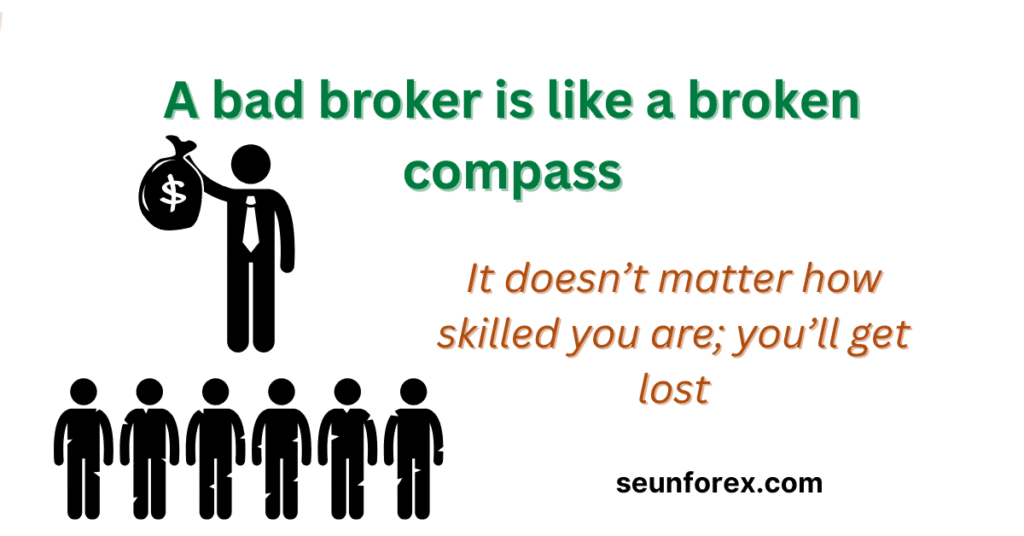
Even if you have the right knowledge, the wrong tools can sabotage your trading journey. From fake brokers to unreliable apps, many traders lose not because of their strategy, but because of the environment they trade in.
🌍 The Global Picture
Around the world, shady brokers target new traders with promises of:
- High bonuses (“Deposit $100, trade with $500”)
- Zero spread (but with hidden commissions)
- Guaranteed profits (a big red flag)
Unregulated brokers often manipulate prices, delay withdrawals, or freeze accounts when traders start winning. Professional traders avoid these traps by sticking to regulated brokers under bodies like FCA (UK), ASIC (Australia), or CFTC (US).
🇳🇬 The Nigerian Reality
In Nigeria, the problem is multiplied. Fake MT4/MT5 apps circulate, designed to look real but actually rigged. Many beginners download them from untrusted sources, deposit money, and never see withdrawals.
I once met a young trader in Ibadan who grew $200 to $1,000—on a fake app. He didn’t know until he tried to withdraw and the app simply vanished from his phone.
Nigerian traders are also lured by Ponzi-style “account managers” who say:
“Give me $100, I’ll trade for you and return $200 in two weeks.”
Nine times out of ten, that money is gone forever.
⚖️ Why Tools Matter
Trading is like war. Even the best soldier can’t win with a fake gun. A skilled trader with a scam broker is powerless.
Your broker and platform are your lifeline—if they cheat, delay, or collapse, all your skill means nothing.
✅ How to Beat the Tool Trap
- Use regulated brokers. Check licenses before depositing.
- “I recommend starting with Exness for their user-friendly platform and instant withdrawals, especially for Nigerian traders, or IC Markets for raw spreads if you’re focusing on precise entry execution.”
- Download only official apps. MT4/MT5 from MetaQuotes, not random APKs.
- Test withdrawals. Start small and ensure the broker pays before going big.
- Avoid too-good-to-be-true offers. In trading, there are no shortcuts.
As the saying goes:
“A bad workman blames his tools, but in trading, bad tools can destroy even a good workman.”
Choose wisely, or risk joining the 90% who lose.
⏳ Lesson 7: Day Trading vs. Long-Term Investing
One of the biggest mistakes beginners make is confusing trading with investing. They believe buying and holding forex positions is the same as holding stocks—or that quick daily trades guarantee faster profits.
🌍 The Global Picture
Globally, professional traders and investors play very different games. Why 90% of day traders lose money becomes clear when you compare their mindset:
- Investors (like Warren Buffett) think in years. They focus on value, growth, and compounding.
- Traders think in hours, days, or weeks. They focus on timing, trading psychology, and risk management in trading.
The problem? Most new traders want the speed of trading but the certainty of investing. They end up in no-man’s land—holding losing trades for weeks, hoping they “turn around,” which is one of the most common forex trading mistakes.
For example, a trader who loses $500 on EUR/USD doesn’t cut losses. Instead, they say:
“I’ll hold it like a long-term investment.”
But forex isn’t a stock. Currencies don’t “grow in value” like companies. Without a stop loss, small losses snowball into margin calls.
🇳🇬 The Nigerian Reality
In Nigeria, this confusion is fueled by hype. Many beginners watch influencers say:
“I made ₦200,000 in one day trading forex.”
So they believe day trading is the fastest road to riches.
Others hear about Warren Buffett or Dangote and assume:
“If I just hold my trades long enough, I’ll be like an investor too.”
But they miss the key point: forex is a leveraged, high-risk market. Holding blindly is financial suicide.
I once spoke with a trader in Lagos who turned ₦50,000 into ₦200,000 in one week—only to lose everything the next because he refused to close a bad trade, saying:
“It will bounce back, let me invest in it.”
That mindset destroys more Nigerian accounts than bad analysis ever will.
✅ How to Balance the Two
- If you want to invest, focus on stocks, ETFs, or real estate.
- If you want to trade forex, treat it like a business—set clear rules, cut losses, and take profits.
- Don’t mix the two. Choose your lane and master it.
As Paul Tudor Jones (a legendary trader) once said:
“Losers average losers.”
Stop turning bad trades into “investments.”
🚀 Lesson 8: The Way Out
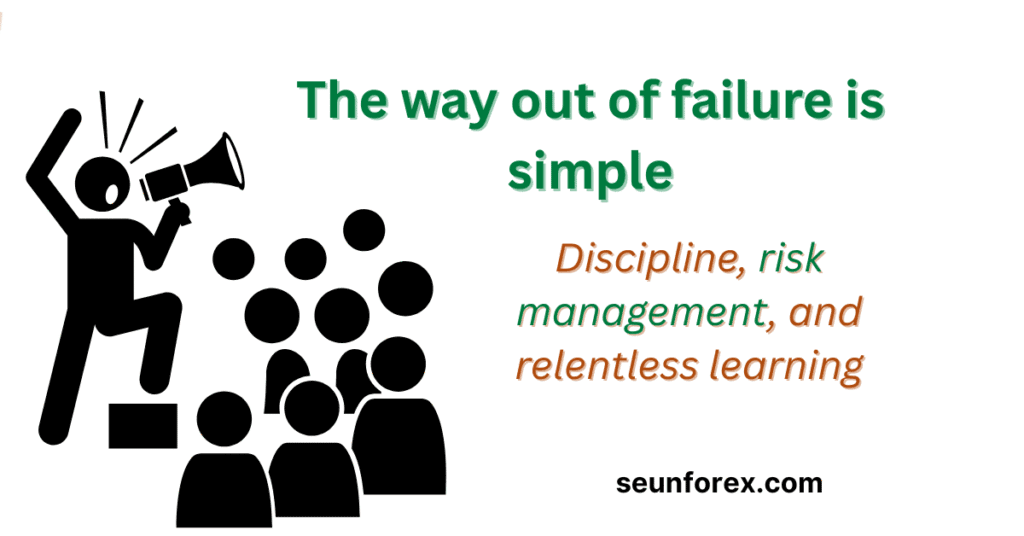
After exposing the traps, let’s talk solutions. How can Nigerian traders—and traders everywhere—escape the 90% failure rate and move into the 10% that thrive?
🌍 The Global Formula for Success
Across the world, profitable traders share three habits:
- Discipline. They follow rules like pilots follow checklists.
- Risk Management. They never risk more than 1–2% per trade (learn more here).
- Continuous Learning. They study markets daily and adapt.
Profitable trading isn’t about predicting every move—it’s about managing risk so losses don’t kill you and wins pay off big.n’t about predicting every move—it’s about managing risk so losses don’t kill you and wins pay off big.
🇳🇬 The Nigerian Blueprint
For Nigerians, the journey requires even more resilience because of local challenges:
- Scam brokers make withdrawals tough.
- High internet/data costs discourage learning.
- Economic pressure pushes people to chase quick money.
But those who succeed here develop stronger discipline than most global traders. Surviving Nigeria’s forex scene is like training at high altitude—if you can thrive here, you can thrive anywhere.
✅ Practical Steps Out of the Trap
- Treat forex like a business. Have a plan, budget, and strategy.
- Start small. Prove consistency with $50–$100 before scaling.
- Master risk-reward. Aim for setups where you risk $1 to make $5+.
- Focus on psychology. Journal trades, track emotions, and review mistakes.
- Use legit brokers. Test withdrawals first, don’t trust hype.
The real secret? Patience.
Profitable trading is not about getting rich quick—it’s about staying alive long enough to let skill and compounding work.
As the saying goes:
“The market will test your patience before it rewards your skill.”
📝 Conclusion: Why 90% of Day Traders Lose—and How You Can Be Different
The truth is simple: day trading is hard. Globally, 9 out of 10 traders fail—not because the market is unbeatable, but because they step in unprepared.
- They chase quick riches instead of building skill.
- They ignore risk management, turning small losses into account blowouts.
- They trade on emotions—fear, greed, and impatience—rather than logic.
For Nigerians, the struggle is amplified by poor regulation, unreliable brokers, and the social pressure to “blow” quickly. Yet, these challenges also shape some of the toughest, most disciplined traders on the continent.
If you truly want to escape the 90%, remember this:
👉 Trading is not gambling. It is not a shortcut. It is a business.
Businesses take time, planning, and capital. The traders who succeed treat forex with the same seriousness Dangote treats cement or Warren Buffett treats investments.
For a detailed roadmap, check out our First Year Forex Trading Guide to learn step-by-step how to survive and thrive in your first year.
🚀 Your Next Step
Here’s what you can do starting today:
- Educate yourself daily. Read, backtest, and learn from mentors.
- Respect risk. Never risk more than 1–2% per trade.
- Focus on quality, not quantity. One good trade a week can change your account.
- Think long-term. Trading is a marathon, not a sprint.
If you’re reading this from Nigeria, remember: your journey might feel harder, but your discipline will be stronger. If you’re reading from outside Nigeria, understand that trading humbles everyone equally.
The market doesn’t care who you are—it only rewards those who respect its rules.
“Ready to Join the Profitable 10%? Start with a broker that supports your growth journey. Open a demo account with Exness to practice risk-free, or try IC Markets for professional-grade execution.”
⚡ Final Word: Don’t aim to be in the 90% that lose. Aim to be in the 10% that survive, learn, and thrive.
Because once you master risk, control your emotions, and stay consistent…
👉 The market stops being your enemy and starts being your partner.